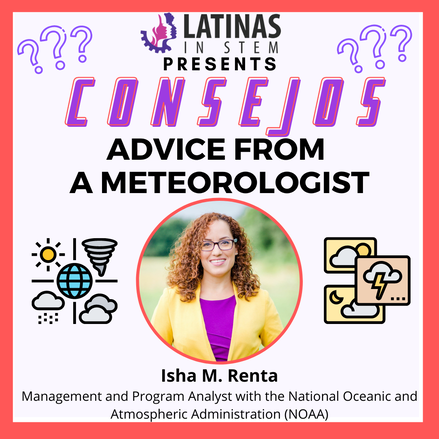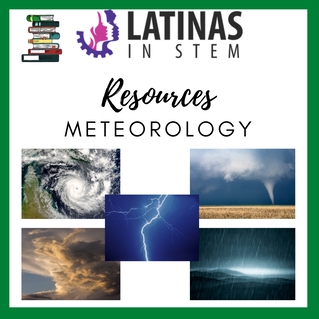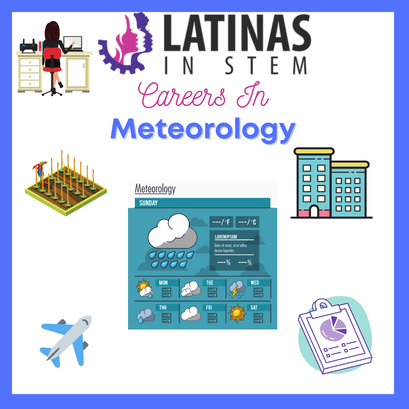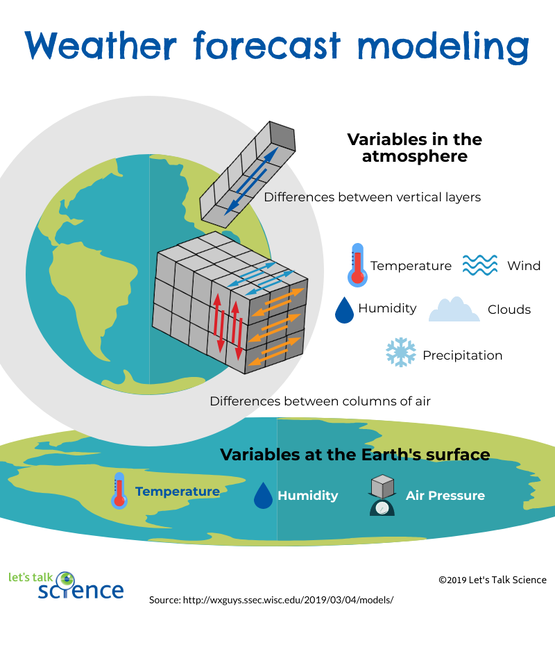Although there are several things in this field that excite me, one of them at the forefront is the challenges forecasting. Weather is always changing, from day-to-day to seasons to unique weather events. There is always new experiences and challenges and no two days are ever the same. This means that the learning and growing never stops. From employing all of your skills to forecast each unique weather event to learning and employing the latest research findings and new technologies...the challenges and developments is the only constant. Although I enjoy these things greatly and they truly are my favorite, my passion is communicating this science to the community and partners. The science of meteorology can be a thrill and its phenomena quite impressive, but it is useless if people don’t understand clearly what is going to happen and how to stay safe.
Liset asks: How can high school and college students better prepare during school to be a meteorologist? Both academically and life skills wise.
I highly recommend that you focus on your science and math classes in high school as these will give you a strong foundation for the meteorology courses. If you can complete advanced courses such as pre-calculus, earth sciences and/or computer science, they will give you a great lead. For communicating science, polish your writing and oral skills in the English class. Every structure needs a solid foundation and this is your foundation.
While in college, try to get a degree in meteorology or atmospheric sciences. Some of the requirements will vary depending on what you want to focus your career on. If you want to be on T.V., then you will need a Broadcast Meteorology degree. If you want to work for the National Weather Service, you will need these basic requirements (https://www.opm.gov/policy-data-oversight/classification-qualifications/general-schedule-qualification-standards/1300/meteorology-series-1340/). If you want to be a researcher, you should focus on getting a doctoral degree. It is important to mention that you do not need a bachelor’s degree in meteorology to get a master’s or doctoral degree in the same field. You can check this list of degree programs in meteorology or atmospheric sciences and their requirements:
https://nwas.org/membership/committees/education/colleges-universities/
Overall, the most important thing you can do to prepare yourself is challenge yourself. Be uncomfortable and don’t fear challenges.
Anonymous asks: What do meteorologists do for fun at work?
I always say that you are never too old to play with balloons! :)
One of my favorite and fun things to do while at work is to release weather balloons. The weather balloon is released twice a day from different parts of the world and at the same time. It has an instrument attached to it called a radiosonde, and it collects measurements of temperature, humidity, pressure, wind speed and wind direction as it moves up into the sky. Its data is relevant to understand the current environment and also for the computer models that are used for weather forecasting. You can watch a short video here:
https://twitter.com/IshaRenta/status/1257997560125456384
Other than that, every team has its own dynamic and it always provides laughter even in the most stressful of times.
Anonymous asks: What advice would you give your younger self?
I would say: “Be persistent and stay focused on your goals. It will not be a straight line from point A to point B. There will be curves and dangerous turns, but you have to keep aiming at that goal. Make sure you put in the work and don’t settle for anything less than perfection. Strive for the highest grades and be fearless about getting experience and exposure to the field. Don’t forget to always give your best and put your heart into everything you do, because everything that is done this way will bounce back to you in blessings. Most importantly, always be thankful to those that have extended themselves in support to you, and make sure you pay it forward to those coming behind you.”
Anonymous asks: Can meteorologists predict how cold a winter will be? How far ahead can you predict the weather?
Before I answer the question, I would like to clarify that weather and climate are not the same. Weather is the state of the atmosphere at any given time and place. While climate is the long term average of the weather in a given place. Climate is the usual weather you expect, while weather is what you get.
Now back to the question:
Meteorologists use seasonal *climate* predictions or outlooks to determine how a season will be compared to the normal (average) temperature and precipitation. These are useful to look at the winter season and determine if it will be colder or warmer than normal, or wetter or drier than normal for a particular region. You can check the latest winter outlook from NOAA in this website: https://www.noaa.gov/media-release/us-winter-outlook-cooler-north-warmer-south-with-ongoing-la-nina
For the second question: Skillful *weather* predictions can run out to about 7 to 10 days depending on your source. Climate predictions can be used to predict longer periods, like seasons, years or decades ahead.
Anonymous asks: Where are the best places to live on earth in terms of fewest natural disasters?
Based on several online resources, it seems like Qatar, United Arab Emirates and Saudi Arabia are the safest places on Earth due to their geographical position away from major weather related events, and also no earthquake activity. Keep in mind that the average temperature over these regions can go from 50°F in winters, to 110°F in summers, so it can get very hot.
https://www.popularmechanics.com/science/environment/a25230/safest-place-on-earth/
Anonymous asks: What major or focus do you need to study to become a meteorologist?
A college degree in Atmospheric Sciences, Meteorology or Broadcast Meteorology will help you become a meteorologist. An Atmospheric Sciences or Meteorology degree should have all the courses needed, but if you want to be on T.V., you should study Broadcast Meteorology, which includes the communications courses needed and the green screen experience. But again, as I answered in another question, math and science are your foundations in either path you take.
Anonymous asks: Other than weather forecaster on TV, what other jobs do meteorologist hold?
Meteorologists can become weather forecasters or researchers for the federal government, such as the NOAA (National Weather Service), NASA, the Navy or the Air Force, and others. In the state governments they are employed within their departments of natural resources, air quality or the state climatologist office. Private companies also hire meteorologists, some examples are:
- Insurance providers (risk management and mitigation)
- Energy providers
- Emergency management organizations
- Consulting firms
- Agricultural businesses
- Transportation industry (aviation, highways)
- Weather instrumentation (development and sales)
I found this good resource of meteorology careers here: https://www.weather.gov/media/bro/outreach/pdf/CareerOpportunitiesMeteorology.pdf






 RSS Feed
RSS Feed

